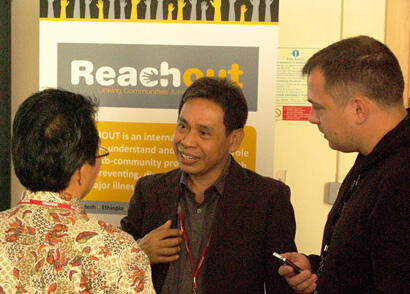
LSTM yesterday hosted the launch of REACHOUT, a consortium of eight partners supported by a 5 year EU FP7 grant, coordinated by LSTM. The consortium aims to maximize the equity, effectiveness and efficiency of close-to-community (CTC) health workers in preventing, diagnosing, and treating major health problems in rural areas and urban slums in Mozambique, Indonesia, Kenya, Malawi, Ethiopia and Bangladesh.
A CTC provider is a health worker who carries out promotional, preventive and/or curative health services and who may be first point of contact for health issues at community level. A CTC provider can be based in the community or in a basic health facility. CTC providers are being lauded by some sections of the global health community as a significant force for good in strengthening weak and dysfunctional health systems. CTC providers are often volunteers and are often women carrying out their role in challenging circumstances. From an equity perspective REACHOUT could provide important insights into how their effectiveness and quality could be improved, in terms of better support and greater efficiency, highlighting the value of their hard work.
On the importance of REACHOUT, Dr Miriam Taegtmeyer, REACHOUT Coordinator says: “REACHOUT will work with a body of competent researchers and institutions, generating much-needed research on close to community providers”.
LSTM Director, Professor Janet Hemingway welcomed those present and introduced Dr Sally Theobald (REACHOUT PI with Miriam Taegtmeyer), who summarized REACHOUT saying: “close to community health workers will be crucial in the promoting universal health coverage”.
Dr Theobald then introduced each of the consortium partners from Eijkman Institute, Indonesia; James P Grant School of Public Health, BRAC University, Bangladesh; Sidama Health Zone/TB REACH, Ethiopia; University Eduardo Mondlane, Mozambique; Liverpool VCT, Kenya; REACH Trust, Malawi and the Royal Tropical Institute (KIT), Netherlands;
Dr Rukhsana Ahmed, from the Eijkman Institute, said: “maternal health is a big issue in Indonesia and our job is to identify the gaps and find the best solutions.” While Korrie De Koning from KIT commented: “The shortage of human resources in health is important and the contribution of the close-to-community providers is close to our hearts.”
During REACHOUT’s first year LSTM needs to develop the research agenda and put in place the systems and tools to make the project understandable to internal and external stakeholders and support staff in doing their work. A priority will be to analyse the contexts in which CTC providers work from multiple perspectives so that innovate changes can be made and to encourage learning and sharing across the consortium.
Dr Miriam Taegtmeyer thanked the partners for coming to LSTM and presenting their role within REACHOUT. Inviting attendees to view the research posters present and talk further with the project partners and staff from LSTM.